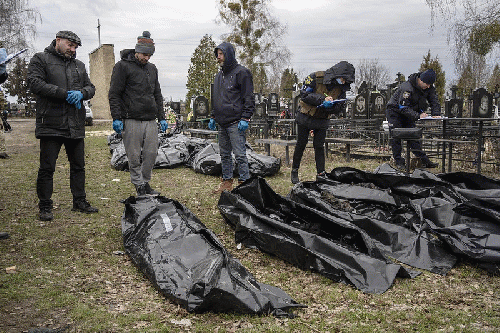While international investigators gather evidence of wartime atrocities in Ukraine, a war crimes trial concerning harrowing events in another part of Europe is taking place. Hashim Thaçi, the former president of Kosovo, and three associates are accused of committing war crimes and crimes against humanity between 1998 and 1999, during which Kosovo's primarily ethnic Albanian populace fought against their Serbian rulers, ultimately achieving independence in 2008. The proceedings could offer insights for future endeavors to address war crimes cases stemming from Russia's invasion of Ukraine.
The International Criminal Court in the Hague has issued an arrest warrant against Russian President Vladimir Putin. It accuses him of being responsible for war crimes in Ukraine, including the unlawful deportation of children.
In 1999, NATO initiated air strikes against Serbia to put an end to the severe repressions inflicted upon Kosovars by Slobodan Miloševi?'s regime. In 2008, Western powers determined that granting independence to Kosovo was the most effective solution to a problem originating from the early 20th-century history of the Balkans.
However, due largely to opposition from Russia and China, the UN Security Council did not authorize either NATO's intervention or Kosovo's independence. Even today, five European Union nations with their own separatist minority populations - Cyprus, Greece, Romania, Slovakia, and Spain - do not acknowledge Kosovo's sovereignty. In addition, China, India, Russia, and numerous other countries do not recognize Kosovo either, which prevents the country from achieving membership in the UN.
Documenting war crimes during a war can be a challenging task, but investigators use various techniques and methods to gather evidence and document the atrocities committed. As is currently taking place today in Ukraine, investigators can interview witnesses who have seen or experienced the war crimes firsthand. These accounts can provide valuable information about the crimes committed, the perpetrators, and the victims.
Investigators can collect physical evidence, such as weapons, ammunition, and explosives, that can be analyzed to identify the perpetrators of the war crimes. They can also gather medical evidence, such as DNA samples, to identify the victims of the crimes. Satellite imagery can also be used to document the destruction of infrastructure, the movement of troops, and the displacement of civilians. This information can be used to support eyewitness accounts and provide a more comprehensive picture of the war crimes.
Investigators can monitor social media for posts and videos that document war crimes. Social media can also be used to identify perpetrators and victims of the crimes. Investigators can obtain official documents, such as military orders and reports, that can provide evidence of war crimes. In some cases, investigators may be able to interview the actual perpetrators of war crimes, either voluntarily or through interrogations.
The Kosovo war crimes trials can have a significant impact on future trials of war crimes. These trials were conducted by the International Criminal Tribunal for the former Yugoslavia (ICTY) and were aimed at prosecuting individuals responsible for war crimes committed during the Kosovo War in the late 1990s. The trials resulted in the conviction of several high-ranking military and political officials, including former Yugoslav President Slobodan Milosevic.
One way in which these trials can affect future war crimes trials is by setting a precedent for the prosecution of war crimes. The ICTY developed legal precedents and standards for the prosecution of war crimes, which can be used as a guide in future trials. The cases can also serve as an example of how to prosecute crimes committed during a conflict and how to balance the interests of justice with the need for stability and peace.
Furthermore, the Kosovo trials have contributed to the development of international criminal law. The trials have led to the establishment of the International Criminal Court (ICC) and the creation of a legal framework for prosecuting war crimes, crimes against humanity, and genocide. This legal framework can be used in future trials to ensure that perpetrators of war crimes are held accountable for their actions.
These past trials have shown that holding individuals accountable for war crimes can contribute to the restoration of peace and justice. By holding perpetrators accountable for their crimes, the trials have helped to promote the rule of law and the protection of human rights. This can serve as a deterrent to future war crimes and contribute to the prevention of conflicts. Such trials have had a significant impact on the development of international criminal law and can serve as a model for future trials of war crimes - including the case of Russia.





